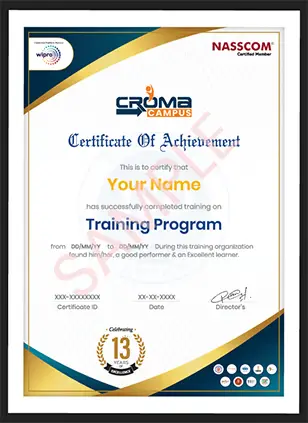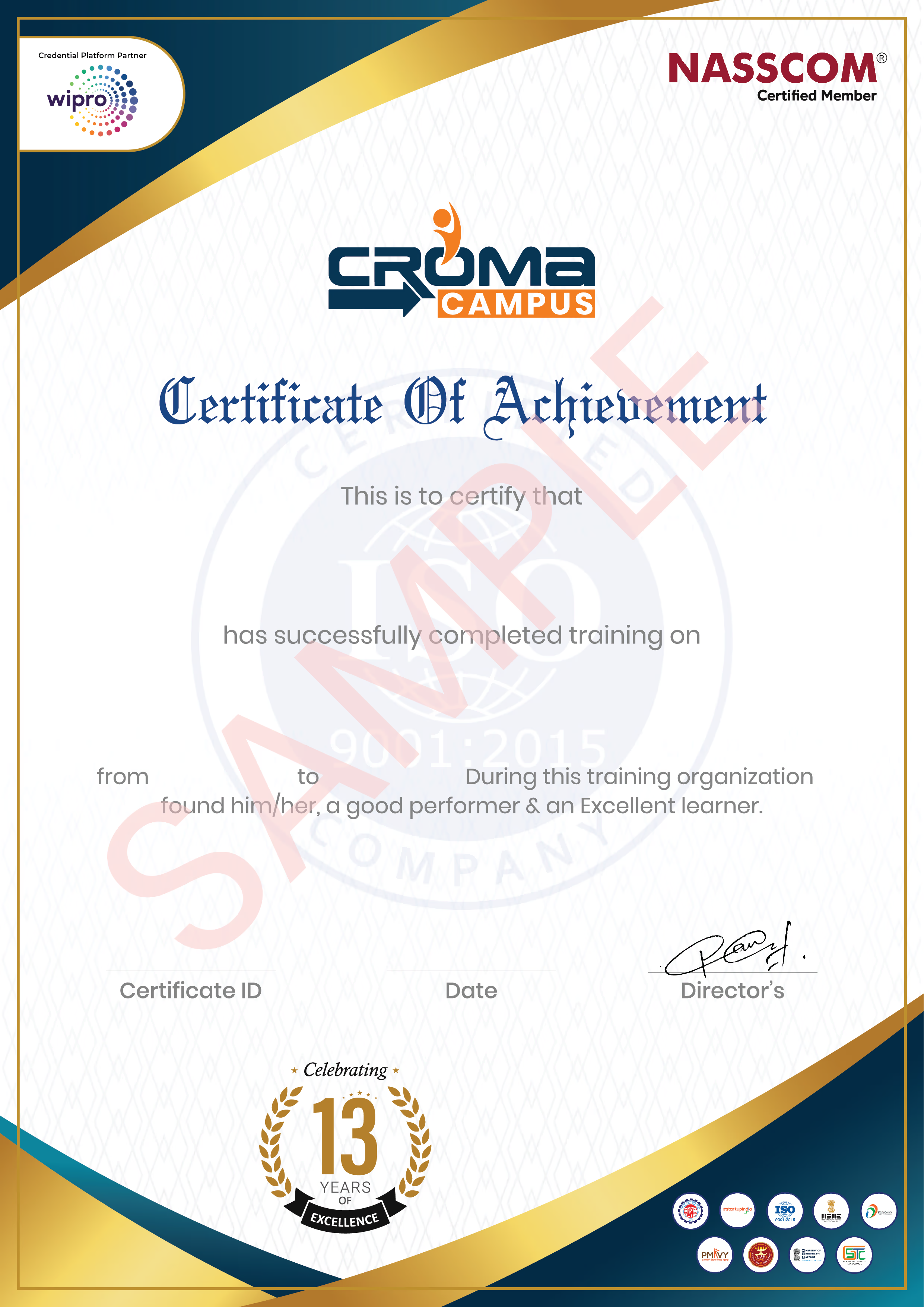- SQL (Structured Query Language) is a programming language used for managing and manipulating databases. By taking an SQL course in Canada, you'll gain the skills needed to work with databases, which is crucial for roles like Data Analyst, Database Administrator, and Business Intelligence Developer. Whether you're new to programming or already have some technical knowledge, an SQL Training in Canada will give you the practical expertise to query and manage data efficiently in the real world. Learn how to handle large sets of data and create custom queries to extract insights for businesses and organizations.
- By completing the SQL Training in Canada, youll be able to:
Master SQL Syntax: Understand and use the key SQL commands like SELECT, INSERT, UPDATE, DELETE, and JOIN.
Work with Databases: Learn how to create and manage databases and tables.
Write Complex Queries: Write complex SQL queries for data retrieval, manipulation, and analysis.
Use SQL for Data Reporting: Create reports and generate insights from large datasets using SQL.
Understand Normalization and Indexing: Learn database design concepts like normalization and indexing for efficient querying.
Manipulate Data: Insert, update, and delete data in relational databases.
Use Aggregate Functions: Learn to use aggregate functions such as COUNT, SUM, AVG, and GROUP BY to summarize data.
Implement Security: Understand how to secure databases, manage access controls, and ensure data privacy.
- SQL skills are highly in demand across various industries. After completing an SQL course, fresh graduates can expect competitive salaries. Heres a general idea of what you could earn in Canada:
- In India, the salaries range from INR 30,00,000 to INR 40,00,000 per year, depending on the role and location.
Database Administrator (DBA): Entry-level salaries for DBAs range from CAD 55,000 to CAD 70,000 per year.
SQL Developer: Entry-level SQL developers typically earn between CAD 50,000 to CAD 65,000 per year.
Data Analyst: Starting salaries for data analysts with SQL skills range from CAD 45,000 to CAD 60,000 per year.
Growth Over Time: With experience, salaries can increase significantly. Senior roles in data management or database administration can earn anywhere from CAD 90,000 to CAD 120,000 or more.
- After completing an SQL Training in Canada, your career can grow quickly, as SQL is a fundamental skill in many data-driven jobs. Heres a general path of career progression:
Start as a Data Analyst: Use SQL to query data, create reports, and help businesses understand their data.
Move to SQL Developer: As a SQL Developer, you will focus on creating, optimizing, and maintaining SQL queries and databases.
Advance to Database Administrator (DBA): As a DBA, you will manage and maintain databases, ensuring that data is stored securely and efficiently.
Consider Data Scientist or BI Developer: With more advanced skills, you can transition into roles like Data Scientist or Business Intelligence (BI) Developer, where you will analyze large datasets and help businesses make data-driven decisions.
- The SQL course is very popular in Canada for several reasons:
Universal Tool for Data Management: SQL is used by virtually every company that works with databases, making it a universally valuable skill.
Industry Standard: SQL is the industry standard for querying and managing databases, and its used by major companies across various sectors.
High Demand: Companies are increasingly hiring SQL professionals for roles related to data analysis, database management, and business intelligence.
Easy to Learn: SQL has a simple, straightforward syntax thats easier for beginners compared to other programming languages.
Core for Data Careers: SQL is essential for many technical roles, including Data Analysts, BI Developers, and Database Administrators.
- With SQL skills, you can take on various roles related to data management and analysis. Some common job roles include:
Data Analyst: Use SQL to extract and analyze data, generate reports, and help businesses make data-driven decisions.
SQL Developer: Develop and maintain SQL queries, optimize performance, and build database systems.
Database Administrator (DBA): Manage and maintain databases, ensuring they are secure, efficient, and accessible.
Business Intelligence Developer: Use SQL to help businesses collect, analyze, and visualize data for better decision-making.
Data Engineer: Work on large datasets, integrate different data sources, and build systems to handle big data.
- Several industries in Canada rely on SQL professionals to manage and analyze data. These industries include:
Technology: Tech companies use SQL for managing large datasets, building apps, and creating databases.
Finance: Banks, insurance companies, and financial institutions use SQL to track transactions, analyze financial data, and manage databases.
Healthcare: Healthcare organizations use SQL to manage patient data and track health information.
Retail: Retailers use SQL to analyze sales data, manage inventories, and understand customer behavior.
Telecommunications: Telecom companies use SQL to handle customer data, network statistics, and billing information.
- Once you complete the SQL Training in Canada, youll receive a certificate that proves your knowledge and skills in SQL. This certificate is recognized by employers and can help you stand out when applying for jobs.
- The fee for an SQL course in Canada varies depending on the institution and the format of the course. On average, you can expect to pay:
Fee Range: CAD 400 to CAD 1,500 for a complete SQL course, depending on the duration and provider.
- For those looking to get an official certification in SQL, such as the Microsoft Certified: SQL Server Database Fundamentals or Oracle Database SQL Certified Associate, the certification exam fee is typically:
Exam Fee: CAD 100 to CAD 200 per exam attempt, depending on the certification level.
- Tools Covered in SQL Course:
SQL Server: A powerful relational database management system for querying and managing data.
MySQL: A popular open-source database system often used in web applications.
PostgreSQL: A highly scalable and reliable open-source database system.
Oracle SQL: A widely used relational database system, particularly in large enterprises.
- Projects Covered in SQL Course:
Database Creation and Management: Build and manage your own databases and tables.
Data Extraction: Write SQL queries to extract and manipulate real-world data.
Performance Optimization: Learn how to optimize queries for better performance with large datasets.
Why should you learn SQL Course?
By registering here, I agree to Croma Campus Terms & Conditions and Privacy Policy
 Course Duration
Course Duration
20 Hrs.
Flexible Batches For You
19-Apr-2025*
- Weekend
- SAT - SUN
- Mor | Aft | Eve - Slot
21-Apr-2025*
- Weekday
- MON - FRI
- Mor | Aft | Eve - Slot
16-Apr-2025*
- Weekday
- MON - FRI
- Mor | Aft | Eve - Slot
19-Apr-2025*
- Weekend
- SAT - SUN
- Mor | Aft | Eve - Slot
21-Apr-2025*
- Weekday
- MON - FRI
- Mor | Aft | Eve - Slot
16-Apr-2025*
- Weekday
- MON - FRI
- Mor | Aft | Eve - Slot
Course Price :
 278
278
 250 10 % OFF, Save
250 10 % OFF, Save
 28
28
Timings Doesn't Suit You ?
We can set up a batch at your convenient time.
Program Core Credentials
Trainer Profiles
Industry Experts
Trained Students
10000+
Success Ratio
100%
Corporate Training
For India & Abroad
Job Assistance
100%
Batch Request
FOR QUERIES, FEEDBACK OR ASSISTANCE
Contact Croma Campus Learner Support
Best of support with us
CURRICULUM & PROJECTS
SQL Certification Training
Mock Interviews

Phone (For Voice Call):
+91-971 152 6942WhatsApp (For Call & Chat):
+919711526942SELF ASSESSMENT
Learn, Grow & Test your skill with Online Assessment Exam to
achieve your Certification Goals

FAQ's
The course typically lasts between 4 to 6 weeks, depending on the training provider and whether it’s a full-time or part-time course.
No, the course is beginner-friendly and doesn’t require prior programming knowledge. It’s designed for those new to SQL and databases.
Yes, many institutions offer placement assistance, including resume building, interview preparation, and job leads.
The course covers SQL Server, MySQL, PostgreSQL, and other common database systems, along with SQL query writing and optimization techniques.
Yes, you will work on hands-on projects that involve real datasets to build your skills in writing and optimizing SQL queries.

- - Build an Impressive Resume
- - Get Tips from Trainer to Clear Interviews
- - Attend Mock-Up Interviews with Experts
- - Get Interviews & Get Hired
If yes, Register today and get impeccable Learning Solutions!

Training Features
Instructor-led Sessions
The most traditional way to learn with increased visibility,monitoring and control over learners with ease to learn at any time from internet-connected devices.
Real-life Case Studies
Case studies based on top industry frameworks help you to relate your learning with real-time based industry solutions.
Assignment
Adding the scope of improvement and fostering the analytical abilities and skills through the perfect piece of academic work.
Lifetime Access
Get Unlimited access of the course throughout the life providing the freedom to learn at your own pace.
24 x 7 Expert Support
With no limits to learn and in-depth vision from all-time available support to resolve all your queries related to the course.
Certification
Each certification associated with the program is affiliated with the top universities providing edge to gain epitome in the course.
Showcase your Course Completion Certificate to Recruiters
-
Training Certificate is Govern By 12 Global Associations.
-
Training Certificate is Powered by “Wipro DICE ID”
-
Training Certificate is Powered by "Verifiable Skill Credentials"








.webp)























 Master in Cloud Computing Training
Master in Cloud Computing Training